December 2023
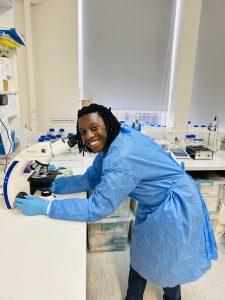 Dr Tatenda Murangi has volunteered to help create pre-course modules late this year and he is therefore our last Ambassador of the Month for 2023. Tatenda recently started a position as a post-doctoral fellow at Trinity College Dublin as part of Professor Fallon’s translational immunology group. His move to Ireland comes after the completion of his PhD in Clinical Science and Immunology at the University of Cape Town. Tatenda was a part of the Division of Immunology in the Department of Pathology. During his studies he worked in the prestigious Infectious Disease and Molecular Medicine Institute (IDM) and was supervised by Professor Michael Levin and Professor William Horsnell as well as collaborator Professor Franco H Falcone in Germany.
Dr Tatenda Murangi has volunteered to help create pre-course modules late this year and he is therefore our last Ambassador of the Month for 2023. Tatenda recently started a position as a post-doctoral fellow at Trinity College Dublin as part of Professor Fallon’s translational immunology group. His move to Ireland comes after the completion of his PhD in Clinical Science and Immunology at the University of Cape Town. Tatenda was a part of the Division of Immunology in the Department of Pathology. During his studies he worked in the prestigious Infectious Disease and Molecular Medicine Institute (IDM) and was supervised by Professor Michael Levin and Professor William Horsnell as well as collaborator Professor Franco H Falcone in Germany.
What drew you to the field of immunology?
I have always been a curious person and one of the things that have been of great interest has been the need to understand how and why people get sick. Since the immune system is our defence against pathogens, that interest coupled with how immunology was taught to me made the pursuit of immunology as a career such a viable option.
Care to give us a brief into what your project entails?
My PhD built on the foundation laid by my undergraduate studies in which I majored in Tropical Disease Biology. As such I interrogated the role of parasite exposure in the development of alpha-gal sensitization. Alpha-gal allergy, also known as red meat allergy, is an allergic condition in which affected individuals mount an immune response towards anything that has alpha-gal i.e. food products and/or pharmaceutical products from a mammalian source. The results from my PhD led to a novel discovery on the presence of alpha-gal in two local South African tick species (Amblyomma hebraeum and Rhipicephalus evertsi) and the helminth Ascaris lumbricoides. We also established a correlation between antibodies to these parasites and an increase in antibodies against alpha-gal.
How did you initially hear about Immunopaedia?
My first encounter with Immunopaedia was through the University of Cape Town division of Immunology webpage. From there I went to the Immunopaedia site where I signed up for the newsletter. Immunopaedia has been a valuable resource which allows me to refresh my immunology knowledge and keep up to date with the latest developments in the field.
What sparked your interest in becoming an Immunopaedia ambassador?
The need to be a part of something bigger than myself prompted me to be an Immunopaedia ambassador. Immunology training is essential in the development of better health platforms if global health goals are to be attained. As an Immunopaedia ambassador I get to be a part of this growing body of researchers and clinicians positively impacting the world.
What difference do you feel Immunopaedia has made in your educational and scientific journey so far?
Immunopaedia made it easy for me to re-visit and augment my current understanding of immunology through their online courses. The way the course material was presented made immunology less intimidating which is always a plus.
As someone who has just finished their PhD, what advice do you have for incoming PhD students and those in the middle of things?
It is okay not to have all the answers. It is only when you admit that you do not know that you open yourself up to being taught and can learn from those with more experience. The acquisition of knowledge is a marathon and not a sprint.
If you were not in science, what else would you see yourself doing?
I would have loved to be a Creative Director.
What are the top three highlights in Cape Town that you feel everyone else should get to experience?
- Going out for some top-notch ice cream at Tapi Tapi, you will never regret this.
- Destressing by going on a drive along Signal Hill, best spot for watching sunsets and sunrises.
- Hiking is essential, start off with Lion’s Head, it’s the easiest.
Watch Tatenda’s Day of Immunology Video from 2022 – Tatenda Murangi – South Africa
November 2023
We interviewed our Ambassadors in the run up to the IUIS 2023 Congress. Some of them will be there in person! We look forward to meeting them again.
Our full featured Immunopaedia Ambassador interviews are below, shorter versions are also being featured on social media.
Faisal Nuhu
Eunice Kiamba
Thandeka Moyo-Gwete
Macarena Mamberto
Jasmin Knopf
Gabriela Zamora Herrera
Linda Djune
October 2023
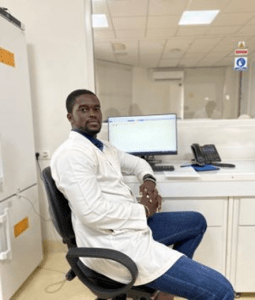 Frédéric Christian Diaz is a PhD student in immunology at the University Cheikh Anta DIOP of Dakar in Senegal. His passion is around immuno-allergology mechanism. Frédéric began his career in pharmaceutical studies and attained a Doctor of Pharmacy. He then pursued a Masters in immunology and has now go on to pursue a doctorate. Frédéric attended the Immuno-Algeria course in 2020 and became an Immunopaedia Ambassador afterwards.
Frédéric Christian Diaz is a PhD student in immunology at the University Cheikh Anta DIOP of Dakar in Senegal. His passion is around immuno-allergology mechanism. Frédéric began his career in pharmaceutical studies and attained a Doctor of Pharmacy. He then pursued a Masters in immunology and has now go on to pursue a doctorate. Frédéric attended the Immuno-Algeria course in 2020 and became an Immunopaedia Ambassador afterwards.
Tell us a bit about the current research work that you are part of?
I am focusing on atopic disorders (atopic march) specially atopic dermatitis immunological mechanism in African Sub-Saharan people (adults and children).
What made you choose the field of Immunology over others?
It is linked to my passion about cells and my perpetual need to understand the mechanisms in which the human body operates.
What drew you to Immunopaedia?
I discovered Immunopaedia during the Immuno-Algeria course, I felt Immunopaedia offers a great opportunity to exchange information with other immunologists, get advice and learn more about senior scientists.
What advice do you have for fellow researchers that are interested in Immunology?
Perseverance and discipline will be the key for any immunologist.
If you were not involved in Immunology, what other scientific fields do you see yourself contributing to?
I will say microbiology!
If you could learn and perform the assay/laboratory technique of your dreams, which one would that be and why?
ELISA: a very useful technique that is ignored by many immunologists!
Master classes are needed specifically in Senegal to better understand this technique and overcome issues which alter results.
If anyone was visiting Senegal for the first time, what do you feel are top 5 things they must not leave without experiencing?
Senegal is is a beautiful country, there are so many places that people should visit:
- Goree and Saloum island
- African renaissance monument
- Didifelo falls
- Niokolo koba natural Park
- Saint louis city
September 2023
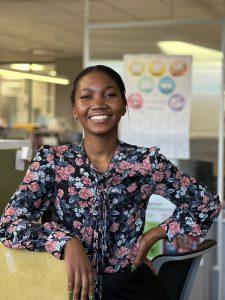 Mbali Nondumiso Mkhonza is a third year PhD student under the supervision of Associate Professor Nelita du Plessis in the Division of Immunology at Stellenbosch University. Following the completion of her undergraduate studies in 2017, she went on to do her BSc Hons (2018) and MSc degrees (2021) in Molecular Biology, with her research focusing on the role of specific genes in mycobacteria infection. Mbali’s research interests include taking an in-depth look at the immune system’s response to infection, specifically focusing on the role that certain immune/effector cells play during the host’s response.
Mbali Nondumiso Mkhonza is a third year PhD student under the supervision of Associate Professor Nelita du Plessis in the Division of Immunology at Stellenbosch University. Following the completion of her undergraduate studies in 2017, she went on to do her BSc Hons (2018) and MSc degrees (2021) in Molecular Biology, with her research focusing on the role of specific genes in mycobacteria infection. Mbali’s research interests include taking an in-depth look at the immune system’s response to infection, specifically focusing on the role that certain immune/effector cells play during the host’s response.
Tell us a bit about the current research work that you are part of?
My current research focuses on the role of MHC-related protein 1 (MR1)-restricted T (MR1T) cells in tuberculosis disease progression. MR1T cells are an innate-like T cell subset, which has been studied in various disease, including cancer, HIV, and tuberculosis. I’m interested in the proportion of these cells that are bacterially activated (we’re able to sort for these specific cells using a tetramer) and want to characterise their phenotype as well as perform a functional assessment of the cytokines that they release. Since tuberculosis continues to be a burdensome disease, exploring this subset of T cells may help shed light on how other effector cells could be assisting the host to defend itself, with the ultimate goal of host-directed therapeutics.
What made you choose the field of Immunology over others?
As I moved more and more into the field of disease research, I wanted to understand our immune system’s response to disease better. I find it so fascinating that our immune system has all these mechanisms it employs to fight off infections and diseases, with the ultimate goal of keeping us alive.
What drew you to Immunopaedia?
After hearing about Immunopaedia from a peer, I searched the website and was very interested in being part of a platform that highlights so much of the incredible research that is going on globally and offers courses that help people learn more about Immunology. I also really enjoy reading the profiles of different researchers.
What advice do you have for fellow researchers that are interested in Immunology?
I would definitely encourage them to explore this field with an open mind. So often we feel restricted in how our knowledge applies to areas outside of our initial training/projects, but Immunology is such a big umbrella and there are still so many avenues that remain to be explored, so no one should limit themselves and think they can’t contribute.
If you were not involved in Immunology, what other scientific fields do you see yourself contributing to?
If I wasn’t involved in Immunology, I would probably pursue a career in science communication and highlighting the importance of medical research to various organisations (schools, government etc).
If you could learn and perform the assay/laboratory technique of your dreams, which one would that be and why?
I would like to work with animal models. This would allow us to get a more holistic view of the impact that the disease and these specific cells have on the host.
If anyone was visiting Cape Town, South Africa for the first time, what do you feel are top 5 things they must not leave without experiencing?
- Red Bus Tour – this will give you a snapshot of the beautiful sights in Cape Town
- Table Mountain – if you’re in Cape Town you must go up Table Mountain (either hike up the mountain or take the cable car – P. S. I am yet to do the hike!)
- The Lookout Hout Bay – you must have some seafood right by the water’s edge! The smell of the ocean as you’re enjoying an afternoon lunch or evening dinner makes it that more special.
- Picnic at Kirstenbosch Gardens – one of the best things to do is just chill with friends, enjoying good food and surrounded by nature.
- Franschhoek Wine Tram – you’ll have the opportunity to see different wine farms along the route and can hop on and off the tram!
August 2023
Gabriela Zamora Herrera is post-graduate student working in the Oncoimmunology and Cytomics Laboratory (CIBIOR IMSS) under Professor Rosana Pelayo. Gabriela is working on predictive scores for pediatric Acute Lymphoblastic Leukemia prognosis, based on bone marrow mesenchymal stromal immunophenotyping, tumor identity and immunecontexture. The group’s main focus is leukemia pediatric patients in Mexico.
Gabriela has interviewed prominent immunologists for Immunopaedia, thank you!
Recent Publications:
- Chronic Comorbidities in Middle Aged Patients Contribute to Ineffective Emergency Hematopoiesis in Covid-19 Fatal Outcomes https://www.science.org/doi/abs/10.1126/scitranslmed.abq0991
- Patient-Derived Bone Marrow Spheroids Reveal Leukemia-Initiating Cells Supported by Mesenchymal Hypoxic Niches in Pediatric B-ALL. https://www.frontiersin.org/articles/10.3389/fimmu.2021.746492/full
- Emergency Hematopoiesis in the Pathobiology of COVID-19: The Dark Side of an Early Innate Protective Mechanism
https://www.liebertpub.com/doi/10.1089/jir.2022.0028
You can get in touch with me by:
ResearchGate – Gabriela Zamora-Herrera
LinkedIn – Gabriela Zamora
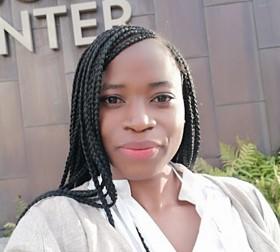 July 2023
July 2023
Linda Djune Yemeli is a final year PhD candidate at the University of Yaoundé 1 and Junior Researcher at the Higher Institute for Scientific and Medical Research (ISM). Linda’s primary research interests include Host-Pathogen Population Biology, Immunobiology and immunogenomics. They are especially interested in the immune markers associated with the different filariasis infection states and the immunomodulation by filarial worms.
Tell us a bit about the current research work that you are part of?
I am currently working an many projects, amongst other the investigation of the phenotypic diversity of serologic response to Onchocerca volvulus in Cameroon, and the elucidation of cytokines pathway involved in the development of adverse events following ivermectin treatment of loiasis.
What made you choose the field of Immunology over others?
I chose immunology over other fields for two main reasons. First of all, immunology is a multidisciplinary science at the center of a lot of translational research. Secondly, to really fight against infectious diseases, it is crucial to understand how the immune system works.
What drew you to Immunopaedia?
I became aware of Immunopaedia in 2019 when I applied for the Immuno-Ethiopia course and the pre-course we had to complete was on Immunopaedia. I therefore had the opportunity to see all the resources that were available on the website. I found that the people working on that project were doing an important and incredible job, and I wanted to be part of it all.
What advice do you have for fellow researchers that are interested in Immunology?
Immunology is an interesting and particularly important field; so, forge ahead and follow your dreams. Also, Immunopaedia will be a good starting point to gain basic knowledge you might need.
If you were not involved in Immunology, what other scientific fields do you see yourself contributing to?
If I were not an immunologist, I think that I would have been bioinformatician or biostatistician.
If you could learn and perform the assay/laboratory technique of your dreams, which one would that be and why?
I really want to learn flow cytometry. It is the best way to identify immuno-competent cells, to quantify changes in expression of surface determinants, and to separate cell population subsets before testing their functional characteristics. For an immunologist it is the dream technology.
If anyone was visiting Yaoundé for the first time, what do you feel are top things they must not leave without experiencing?
If you are visiting Yaoundé, I suggest you visit the National Museum, Mefou National Park, and the Reunification Monument. You must taste Cameroonian food and finally come and see us at the Higher Institute for Scientific and Medical Research.
Recent publications
Djune-Yemeli L, Nana-Djeunga HC, Rush A, Bopda J, et al. (2023) Adverse events, changes in microfilariae density, production cross-reactive antigens and cytokines following ivermectin treatment of loiasis (Plos NTD, In Press).
Djune-Yemeli L, Domché A, Nana-Djeunga HC, Donfo-Azafack C, Lenou-Nanga CG, et al. (2022) Relationship between skin snip and Ov16 ELISA: Two diagnostic tools for onchocerciasis in a focus in Cameroon after two decades of ivermectin-based preventive chemotherapy. PLOS Neglected Tropical Diseases 16(5): e0010380. https://doi.org/10.1371/journal.pntd.0010380
Nana-Djeunga, H.C., Djune-Yemeli, L., Domche, A. et al. High infection rates for onchocerciasis and soil-transmitted helminthiasis in children under five not receiving preventive chemotherapy: a bottleneck to elimination. Infect Dis Poverty 11, 47 (2022). https://doi.org/10.1186/s40249-022-00973-1
June 2023
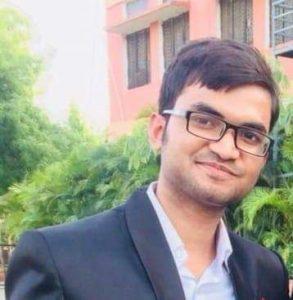 Shubham Kumar is a graduate student at the Regional Biotechnology Centre, Faridabad, India. Shubham enjoys solving problems and learning new skills. He loves science fiction, particularly Star Wars.
Shubham Kumar is a graduate student at the Regional Biotechnology Centre, Faridabad, India. Shubham enjoys solving problems and learning new skills. He loves science fiction, particularly Star Wars.
Shubham’s research interests include finding the link between innate and adaptive immunity. His primary goal is to investigate the variables that govern T-cell responsiveness. He is looking at what genes are involved as well as what cellular components and pathways are responsible.
Tell us a bit about the current research work that you are part of?
I was a member of a study that looked at the function of neutrophils in inducing a skewed immunological response by T cells, which can lead to severe disease. There is evidence that neutrophils play a critical role in producing severe viral infection as well as severe inflammation.
What made you choose the field of Immunology over others?
I was very amazed when I learned that everyone has an immune system which protects us and is constantly evolving. There are lot of mysteries about how the immune system works. I believe understanding the immune system can help us eradicate diseases in the future.
What drew you to Immunopaedia?
I attended an Immunopedia session where they taught skills such as reading scientific papers, writing abstracts and more. I was so delighted by the programme that I decided to join Immunopedia to help other students and learn more.
What advice do you have for fellow researchers that are interested in Immunology?
My advice to my peers is to be consistent and hardworking. Students often make the error of not preparing ahead of time. I recommend that junior scientists figure out what field they want to be in, join a lab to obtain experience and work their way up the ladder. A person can be successful if he or she follows a well-defined route.
If you were not involved in Immunology, what other fields do you see yourself contributing to?
If I had not been an immunologist, I suppose I would have become a bureaucrat since I enjoy analyzing data and drawing conclusions. I want to do something meaningful which can have a good impact on other people’s lives.
If you could learn and perform an assay/laboratory technique of your dreams, which one would that be and why?
I would like to learn single cell sequencing as it is one of the best techniques to learn new things about cells.
If someone was visiting New Dehli (India) for the first time, what do you feel are top things they should see?
If you want to view historical sites, I recommend visiting the Red Fort and the Qutab Minar. There are businesses there where you can buy anything and enjoy tasty food. There are also lovely gardens, such as the Rose Garden.
May 2023
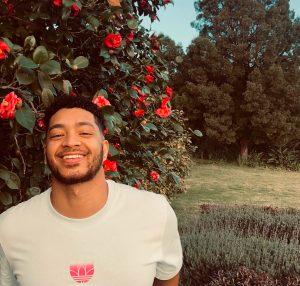 Caleb Petersen is a medical student at Stellenbosch University, South Africa. Under the supervision of A.Prof Nelita Du Plessis and Dr Leigh Kotze in the Division of molecular biology and Human Genetics part of the Immunology research group. He completed his BSc and BSc Hons in molecular biology with an elective in advanced immunology at Stellenbosch University before pursuing a Master’s degree within the immunology research group. In his division, most of the research done is on Mycobacterium tuberculosis (Mtb) and the team specifically investigates the innate immune response of the host to Mtb. Caleb decided to study medicine in the pursuit of building a bridge between what is overseen between clinical pathology and the wet lab science of immunology.
Caleb Petersen is a medical student at Stellenbosch University, South Africa. Under the supervision of A.Prof Nelita Du Plessis and Dr Leigh Kotze in the Division of molecular biology and Human Genetics part of the Immunology research group. He completed his BSc and BSc Hons in molecular biology with an elective in advanced immunology at Stellenbosch University before pursuing a Master’s degree within the immunology research group. In his division, most of the research done is on Mycobacterium tuberculosis (Mtb) and the team specifically investigates the innate immune response of the host to Mtb. Caleb decided to study medicine in the pursuit of building a bridge between what is overseen between clinical pathology and the wet lab science of immunology.
What made you choose the field of Immunology over others?
I remember during my final year I got exposed to the topic of immunology as a subsection of biochemistry, and it completely captivated me. Immunology reminded me of why I wanted to do science, igniting a desire to know more. I went back to my dorm room and started reading and I remember naively thinking I will cure cancer one day by manipulating the immune system to recognise cancerous cells, all before realising how complex cancer was. But none the less, I knew there and then that immunology was what I wanted to do going forward.
Tell us a bit about the current research work that you are part of?
Mtb is a tricky pathogen that has developed mechanisms to not only evade the host immune response but also manipulate the host to construct a niche environment in the form of a granuloma. It is within this granuloma that the pathogen can survive latently for years. During my honours and master’s, under the supervision of some amazing women in science, we worked on the development of a 3D TB lung granuloma model. In this model, we used patient derived cells to construct a 3D spherical organoid that can replicate the in vivo microenvironment of a granuloma. The aim was to have a model that can unlock new information on host pathogen interaction. This is because a granuloma biopsy from a donor with active TB requires ethical clearance. This provides a high throughput model that can give insight into specific host responses and a model that can be used for drug penetration research.
What drew you to Immunopaedia?
To be honest Immunopaedia came as a recommendation from a friend, but I am so pleased to have found a website where I can read up on medical case studies that build a bridge between pathology and hard science.
What advice do you have for fellow researchers that are interested in Immunology?
Immunology is definitely one of the more difficult disciplines but, anything worth pursuing is not easy. The field provides excitement and challenges, perfect for researchers that enjoy solving problems. Once you have a grasp on immunology, it ignites a passion for wanting to know more on how to solves disease mystery’s and even identify immunological complication in loved ones that may present an illness. It is a field that breeds excellence, so be ready to be a lifelong learner.
If you were not involved in Immunology, what other scientific fields do you see yourself contributing to?
As a medical student, I would have to say that I would see myself contributing to the field of medicine. Maybe research in cancer therapies and other forms of drug discovery.
If you could learn and perform the assay/laboratory technique of your dreams, which one would that be and why?
I have experience in flow cytometry and florescent microscopy, but if there was another laboratory technique I would like to learn and master, it would be electron microscopy. I am a big fan of Dr Caroline Beltran’s work and her ability to use multiple microscopy techniques to construct a 3D image of a whole organ that can be digitally dissected and investigated. This allows one to not only look at specific florescent markers, but also different internal and surface structures.
If anyone was visiting Stellenbosch for the first time, what do you feel are top 5 things they must not leave without experiencing?
Stellenbosch is an absolutely beautiful town and university. Some of my top 5 things to do when visiting would be:
- Visiting the wine farms in the surrounding area. Stellenbosch is the wine capital of South Africa with amazing sensory.
- Go to Drop Street and Church Street and enjoy the Sunday market and the variety of South African cuisine.
- Go experience the passion and spirit of students at a varsity cup rugby match.
- Going for a hike up Jonkershoek Nature Reserve to enjoy the beautiful waterwall and mountain biking trail.
- Have lunch at Postcard Café with a nice glass of wine.
April 2023
Onyeka Chukwudozie is an Immunopaedia Ambassador from Nigeria. He is currently pursuing a Ph.D. at the University of California, San Diego, working in Erica Ollmann Saphire’s Lab at the La Jolla Institute for Immunology. Onyeka attended IUIS-FAIS Immuno-Ethiopia a course in 2020. His research involves the fields of immunology, virology, and structural biology to develop long-lasting neutralizing antibodies that are cross-reactive against multiple lineages of Lassa virus. He focuses on characterizing the human B cell response to LASV vaccination using novel, conformation-specific antigens, which could lead to the establishment of effective Lassa virus vaccines. Onyeka aims to contribute to the global fight against viral pandemics and improve the health outcomes of vulnerable populations worldwide.
Recent Publications:
- A cocktail of protective antibodies subverts the dense glycan shield of Lassa virus https://www.science.org/doi/abs/10.1126/scitranslmed.abq0991
- Discovery of putative inhibitors against main drivers of SARS-CoV-2 infection: Insight from quantum mechanical evaluation and molecular modeling. https://www.scienceopen.com/document_file/251f17e6-15bd-4709-88b2-53f026e9554b/PubMedCentral/251f17e6-15bd-4709-88b2-53f026e9554b.pdf
- Immuno-informatics design of a multimeric epitope peptide based vaccine targeting SARS-CoV-2 spike glycoprotein, https://journals.plos.org/plosone/article?id=10.1371/journal.pone.0248061
You can get in touch with me by:
LinkedIn – Onyeka S. Chukwudozie
ResearchGate – Onyeka Chukwudozie
March 2023
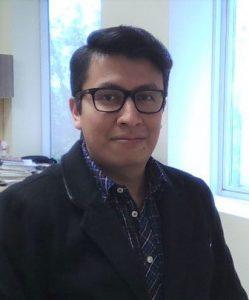 José Luis Maravillas is an Associate Professor at the National Autonomous University of Mexico (UNAM). He completed his undergraduate studies at the National Polytechnic Institute (IPN) and his Master’s and Doctorate studies specializing in Molecular Biomedicine at the Center for Research and Advanced Studies (CINVESTAV), in Mexico. At the end of his studies, he completed a postdoctoral fellowship at the Department of Physiology and Biophysics and at the Institute for Immunology of the University of California, Irvine, in the United States. Besides that, he is the Associate Director of the Center of Excellence of the Federation of Clinical Immunology Societies (FOCIS), with headquarters at the National Institute of Medical Sciences and Nutrition Salvador Zubirán, in Mexico City, Mexico.
José Luis Maravillas is an Associate Professor at the National Autonomous University of Mexico (UNAM). He completed his undergraduate studies at the National Polytechnic Institute (IPN) and his Master’s and Doctorate studies specializing in Molecular Biomedicine at the Center for Research and Advanced Studies (CINVESTAV), in Mexico. At the end of his studies, he completed a postdoctoral fellowship at the Department of Physiology and Biophysics and at the Institute for Immunology of the University of California, Irvine, in the United States. Besides that, he is the Associate Director of the Center of Excellence of the Federation of Clinical Immunology Societies (FOCIS), with headquarters at the National Institute of Medical Sciences and Nutrition Salvador Zubirán, in Mexico City, Mexico.
Research interests:
My research is focused mainly on human B cell immunology. Thanks to our close collaboration with clinical settings, we are currently working on different projects dedicated to characterizing the implications of B cell subpopulations, particularly those with “atypic” phenotypes or features beyond antibody production, in the pathogenesis of diseases such as lupus, COVID-19, or idiopathic inflammatory myopathies. As “B cell people”, my lab is also interested in antibodies. In this regard, it has been described that intestinal IgA preferentially coats different types of bacteria that, under certain conditions, can trigger pathogenic processes (pathobionts). In our lab, we study these IgA-bacteria conjugates at the oral level using 16s rRNA-sequencing, to determine potential contributions of dysbiosis in this cavity, with a particular interest in patients with lupus.
Recent publications:
- Romero-Ramírez S, Sosa-Hernández VA, Cervantes-Díaz R, Carrillo-Vázquez DA, Meza-Sánchez DE, Núñez-Álvarez C, Torres-Ruiz J, Gómez-Martín D and Maravillas-Montero JL (2023) Salivary IgA subtypes as novel disease biomarkers in systemic lupus erythematosus. Frontiers in Immunology. 14:1080154. doi: 10.3389/fimmu.2023.1080154
- Sosa-Hernández VA, Romero-Ramírez S, Cervantes-Díaz R, Carrillo-Vázquez DA, Navarro-Hernandez IC, Whittall-García LP, Absalón-Aguilar A, Vargas-Castro AS, Reyes-Huerta RF, Juárez-Vega G, Meza-Sánchez DE, Ortiz-Navarrete V, Torres-Ruiz J, Mejía-Domínguez NR, Gómez-Martín D and Maravillas-Montero JL (2022) CD11c+ T-bet+ CD21hi B Cells Are Negatively Associated With Renal Impairment in Systemic Lupus Erythematosus and Act as a Marker for Nephritis Remission. Frontiers in Immunology. 13:892241. doi: 10.3389/fimmu.2022.892241
- Cervantes-Díaz R, Sosa-Hernández VA, Romero-Ramírez S, Torres-Ruiz J, Pérez-Fragoso A, Meza-Sánchez DE, Gómez-Martín D, Maravillas-Montero JL (2022) Circulating B10 regulatory cells are decreased in severe and critical COVID-19. Journal of Leukocyte Biology. 112:2, 333–337. doi: 10.1002/JLB.5COVCRA0721-387RR
Why I love immunology:
Because it is a field that is constantly changing. A new discovery about a different cell subset, a novel soluble modulator, or a new function for something traditionally circumscribed to only performing a given thing is emerging almost every day. This way, you can always create new hypotheses and test your ideas.
If I wasn’t an immunologist I would be:
As I always said, an architect!
Tips for young people who want to enter the field of immunology:
Find your niche! Immunology is a very competitive field; it is not wrong to be interested in the mainstream topics around, but there are a lot of exciting and neglected subjects that few people are interested in. They could represent opportunity areas where young scientists could make an impact.
What being an Immunopaedia Ambassador means to me:
It is a great networking opportunity to establish contact with people around the globe. Also, I’m a teacher, a task I enjoy, so representing and being immersed in this outstanding educational initiative is constructive.
How I have contributed to Immunopaedia so far and plans for future contributions:
With some “Breaking news” and Interview contributions, besides covering a couple of meetings where Immunopaedia was present!
You can get in touch with me by:
Website: www.linceb.org/en
Email: maravillas@cic.unam.mx
January 2023
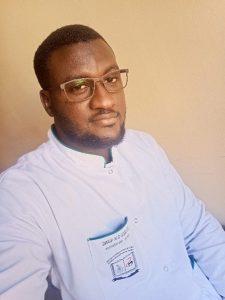 Doudou Georges Massar Niang is from Senegal, he fell in love with immunology during his third year of studying Pharmacy. He received his PharmD degree and his Masters in Immunology and Infection in 2018. Doudou became a PhD candidate in immunology at Cheikh Anta Diop University of Dakar in 2019. His research focuses on deciphering the breast cancer mechanisms of immune escape, identifying immunology-based prognostic biomarkers and potential therapeutic targets. Doudou has also trained in medical bacteriology, virology, parasitology, hematology, cytogenetics, and biochemistry during his 4 years as a resident in hospital laboratories.
Doudou Georges Massar Niang is from Senegal, he fell in love with immunology during his third year of studying Pharmacy. He received his PharmD degree and his Masters in Immunology and Infection in 2018. Doudou became a PhD candidate in immunology at Cheikh Anta Diop University of Dakar in 2019. His research focuses on deciphering the breast cancer mechanisms of immune escape, identifying immunology-based prognostic biomarkers and potential therapeutic targets. Doudou has also trained in medical bacteriology, virology, parasitology, hematology, cytogenetics, and biochemistry during his 4 years as a resident in hospital laboratories.
Publications
1-Niang, DGM, Gaba, FM, Diouf, A, et al. Galectin-3 as a biomarker in breast neoplasms: Mechanisms and applications in patient care. J Leukoc Biol. 2022; 1- 12. https://doi.org/10.1002/JLB.5MR0822-673R
2-Niang, DGM. , Ka, S. , Hendricks, J. , Diouf, D. , Gaba, F. , Diouf, A. , Diop, M. , Mbow, M. , Faye, B. , Diallo, R. , Niang, M. , Deme, A. , Mbengue, B. and Dieye, A. (2022) Profile of Plasma Galectin-3 Concentrations, Inflammatory Cytokines Levels and Lymphocytes Status in Breast Cancer under Chemotherapy. Open Journal of Immunology, 12, 1-14. doi: 10.4236/oji.2022.121001.
3-Mbow M, Dieye PAB, Ba NK, Cisse M, Lo G, et al. (2021) Evaluation an immunofluorescence-based antigen test for hospital point-of-care diagnosis of SARS-CoV-2 infection. Clin Microbiol Infect Dis 6: DOI: 10.15761/CMID.1000192.
Why “I love immunology”
Immunology and history are my two passions, and the analogy I like to use is of cellular immune mechanisms in pathology being similar to medieval history ‘heroes’, in which immune cells defend their ‘land’ or the host at the cost of their lives. Moreover, immunology is a dynamic field with every day providing an exciting discovery and something new to learn. No way of getting bored!
If I wasn’t an immunologist I would be
My dream was to become a professional basketball player. Otherwise, considering my background I would probably become medical biologist.
Tips for young people who want to enter the field of immunology
As young potential future immunologist you should:
- acquire good knowledge about basic immunology
- be curious and try as much as you can to stay up-to-date about your field of interest
- write down and keep every research idea you have while reading
- and get a passport ASAP, there are a lot of inspiring and life-changing people to meet in the immunology world!
What being an Immunopaedia Ambassador means to me
Being Immunopaedia ambassador is like belonging to a family of helpful people. Thanks to my activity as ambassador, I improved my writing skills. Moreover, I met immunologists that are significantly influencing my carreer and some of them become very close friends.
How I have contributed to Immunopaedia so far and plans for future contributions
So far, I have submitted breaking news articles and participated in the writing of Immuno-Tunisia 2021 pre-course materials. Moreover, I always encourage students in our institution to visit Immunopaedia for benefiting from valuable course materials and to subscribe to the newsletter to stay up-to-date with IUIS educational activities. In the future, I would like to submit more breaking news article related to cancer immunology and encourage more Senegalese immunologist to become Immunopaedia ambassador.
You can get in touch with me by
LinkedIn: Doudou Georges M. Niang
Twitter: @DoudouMassar










